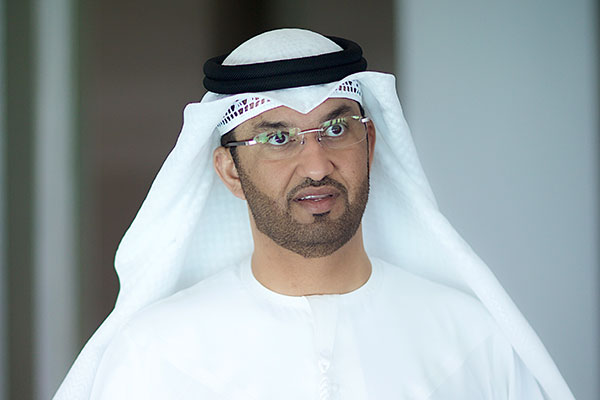
Dr Sultan Al-Jaber
UAE minister to take on as co-chair of GMIS
HANNOVER, Germany, August 31, 2020
The Global Manufacturing and Industrialisation Summit (GMIS) said that Dr Sultan Al-Jaber, UAE Minister of Industry and Advanced Technology will be taking on the role of co-Chair of GMIS, alongside LI Yong, Director General of the United Nations Industrial Development Organization (UNIDO).
GMIS aims to place manufacturing at the heart of economic regeneration and government policymaking, and to be a tool for global cooperation and collaboration. A virtual edition of the Summit (#GMIS2020) is scheduled to take place on September 4-5.
Dr Sultan Al-Jaber, who is scheduled to deliver a keynote on the first day of the Virtual Summit, was recently appointed to lead the newly-formed UAE Ministry of Industry and Advanced Technology.
The Virtual Summit is taking place during a time where the Covid-19 pandemic has placed public health systems and the global economy under severe strain, reinforcing the pressing need for a cross-industrial and cross-functional platform for leaders to share their experiences and knowledge related to advancing manufacturing through the application of fourth industrial revolution technologies, and building more resilient global value chains in a post-pandemic world.
Dr Sultan Al-Jaber said: “In just a short period of time, the Global Manufacturing and Industrialisation Summit has evolved to play an important role in advancing a transformational global agenda that is needed now more than ever. I look forward to working with LI Yong, the Director General of UNIDO to help achieve consensus among stakeholders on how the manufacturing community can drive inclusive and sustainable industrial development. In particular, I look forward to exploring opportunities for greater collaboration between government, industry and technology sectors that can enhance global resilience, while accelerating economic growth and prosperity.”
LI Yong, Director General of UNIDO, said: “UNIDO has cooperated extensively with the Government of the United Arab Emirates through GMIS and several other initiatives, especially the Abu Dhabi Declaration on advanced technology, and we look forward to enhancing this relationship in the years to come. No matter how influential, no one actor can control this phenomenon alone. We can only hope to shape an inclusive and sustainable 4IR through building strong multi-stakeholder partnerships with representatives of national governments, multilateral organizations, the private sector, the research community, and civil society.
“This is why we co-convene GMIS: to leverage our combined knowledge, insights and resources to fuel inclusive and sustainable industrial development. With initiatives such as GMIS we hope to convert theory and best practices into action on the ground.”
The Global Manufacturing and Industrialisation Summit was launched to build bridges between manufacturers, governments and NGOs, technologists, and investors to shape the future of the manufacturing sector and highlight the role of fourth industrial revolution technologies to enable the regeneration of the global economy in line with the 2030 Agenda for Sustainable Development.
The first two editions of the Summit were held in Abu Dhabi, United Arab Emirates in March 2017, and Yekaterinburg, Russia in July 2019, respectively, with each welcoming over 3,000 high-level delegates from over 40 countries.
Under the theme – Glocalisation: Towards Sustainable and Inclusive Global Value Chains, the #GMIS2020 Virtual Summit will feature a cross-section of close to 100 influential global leaders from the public and private sector, including Heads of State, Ministers, and thought-leaders from some of the world’s leading organisations.
The Summit will feature more than 20 virtual sessions, including keynote addresses, panel discussions, and fireside chats, and will cover topics such as Germany’s ‘Marshall Plan with Africa’ and the ‘Global Hydrogen Economy’, as well as key topics impacting global value chains, the adoption of 4IR technologies, localising production capabilities and capacity building, and spreading inclusive and sustainable industrial development.
The Summit will also hold five working group sessions gathering a cross-section of experts from world-leading organisations to discuss the challenges and opportunities related to promoting the role of women in manufacturing; enhancing industrial safety and security; advancing the decarbonisation of industry; developing future leaders of industry; and setting up an Inclusive and Sustainable Industrial Performance (ISID) Index that helps measure the Environmental, Social, and Corporate Governance (ESG) performance of public and private sector entities. – TradeArabia News Service







